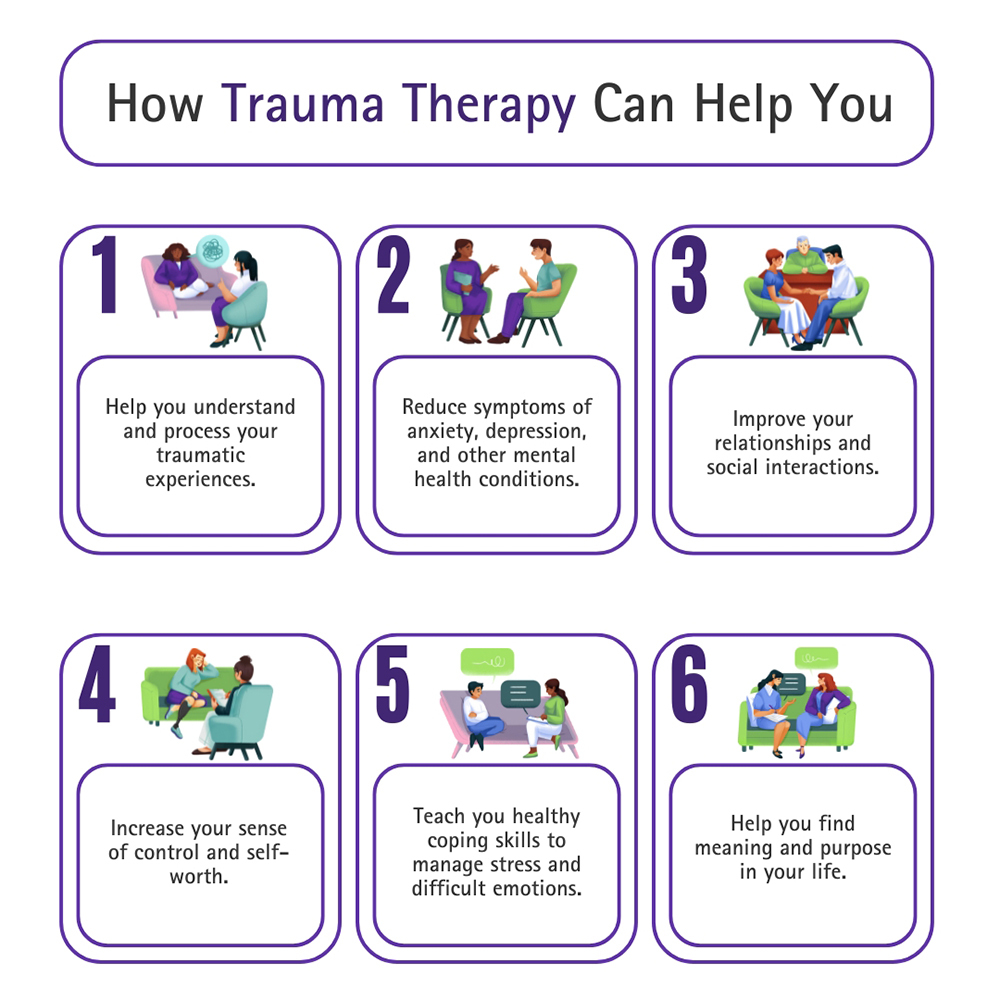What Are the Types of Trauma Therapy?
Our therapists are expertly trained in the following evidence-based interventions:
- Eye movement desensitization and reprocessing (EMDR)
- Cognitive behavioral therapy (CBT)
- Dialectical behavioral therapy (DBT)
- Art and music therapy
- Somatic therapy
- Psychodynamic therapy
- Emotional focused therapy (EFT)
- Narrative exposure therapy (NET)
- Hypnotherapy
- Internal family systems therapy
- Cognitive processing therapy (CPT)
- Accelerated resolution therapy (ART)
- Individual therapy
- Brainspotting
- Brief eclectic psychotherapy (BEP)
- Inner child work
- Imagery rehearsal therapy (IRT)
- Instinctual trauma response therapy (IRT)
Our therapists are highly trained and experienced in a variety of trauma therapy interventions, enabling us to create individualized treatment plans to address your specific needs and goals.
What Is Trauma Therapy?

Trauma Therapy is a specialized form of psychotherapy used to help individuals who have experienced traumatic events overcome the negative emotional and psychological effects of trauma.
Some important aspects of trauma therapy include:
- Safety and confidentiality
- Evidence-based interventions
- Emotional regulation
- Trauma reprocessing
- Psychoeducation
- Holistic approach
- Therapeutic relationship
Our therapists at Trauma Therapy Center specialize in trauma healing and helping you regain a sense of control, function better in daily life, improve your relationships, and accomplish your goals.
Restless worries vanish, replaced by a sense of normalcy and clarity that empowers me to confidently tackle any challenge. With Liz by my side, there is nothing I cannot conquer.
Embrace Healing The Power of Trust in Therapeutic Relationships
“In my experience, the most effective aspect of therapy is the therapeutic relationship. Establishing trust between a client and clinician is the first step to healing.”
What Can Trauma Therapy Help With?
Trauma therapy can help with a wide range of issues, including:
- Anxiety
- Depression
- Substance use disorders
- Relationship problems
- Self-harm
- Eating disorders
- Grief
After trauma therapy, you will feel relief from your negative emotions and experiences. You’ll gain a sense of empowerment to take on more difficult challenges. You will feel a sense of resilience and strength to navigate life’s challenges.

What Are the Benefits of Trauma Therapy?
The benefits of trauma therapy include:
- Moving forward- Our traumatic experiences can imprint on us in a way that feels like they control our lives. After trauma therapy, you will be able to move forward from your past negative experiences and create the future you want for yourself.
- Healthy coping skills- Problems and stress always occur in life. Trauma therapy helps you take on these challenges while decreasing stress and improving problem-solving.
- Improved awareness- Learning about yourself can be one of the most important things you can do. Awareness can help you identify things you love about yourself and some areas you need to improve on. Awareness is the key to growth and self-improvement.
- Sense of safety- Trauma robs us of the ability to feel safe in the world. Through trauma therapy, you can begin to identify safe and calm places.
- Emotional regulation– Trauma can make us feel overwhelmed and make it difficult to regulate our emotions. Trauma management’s first step is learning to recognize, name, and handle difficult emotions.
Your counselor will tailor your trauma therapy to your specific needs and goals. As long as you are honest about your experiences, thoughts, feelings, and concerns you can attain all the benefits of trauma therapy.
How Effective Is Trauma Therapy?
According to a study published in PubMed, “41% to 95% lost their PTSD diagnosis at the end of [trauma] treatment”. Over multiple studies, psychotherapy was shown to be extremely effective in treating PTSD, depression, and anxiety.
A study in the Journal of Clinical Psychology published, “A meta-analysis of 22 studies found that trauma-focused therapy (TFT) was significantly more effective than no treatment for reducing PTSD symptoms, with an average effect size of 0.86.”
According to the Journal of Nervous and Mental Disease, “A study of EMDR for PTSD found that 75% of participants no longer met the diagnostic criteria for PTSD after treatment.“
In my experience, clients after trauma therapy experience at least a 50% decrease in PTSD symptoms after just 2 months of working together. I utilized CBT with one client whose PTSD scores decreased from 49 to 9 after 2 months. I believe trauma therapy can change lives and I’ve witnessed it first hand.
How Long Does Trauma Therapy Take?
The length of trauma therapy depends on several factors, such as:
- The severity of your trauma
- Willingness to try new skills learned in therapy
- Consistency with therapy
Some things you can do to get the most out of trauma therapy include:
- Be honest with your therapist about your symptoms
- Maintain consistency with sessions
- Remain open about trying new things
It’s important to remember that trauma therapy is about progress and that progress is not always linear. You may have setbacks. But your therapist will always be there to support you throughout the process.
How Do I Find a Trauma Therapist?
The best way to find a trauma therapist is first to identify what you are looking for in a therapist. Then, read about that therapist online. Consider their education, experience, personal values, and outlook on life. The most important part of finding the right therapist for you is to meet with someone. You want to feel safe and comfortable in the presence of your therapist.
If you are living with trauma symptoms, our therapists at the Trauma Therapy Center in West Palm Beach can help. We use the latest research-based interventions to help you heal from your trauma and reclaim your life. We will work with you to create a personalized treatment plan that meets your individual needs. Contact us today to learn more about our services and how we can help you on your journey to recovery.

